Search titles
Displaying results 1 to 10 of 628.
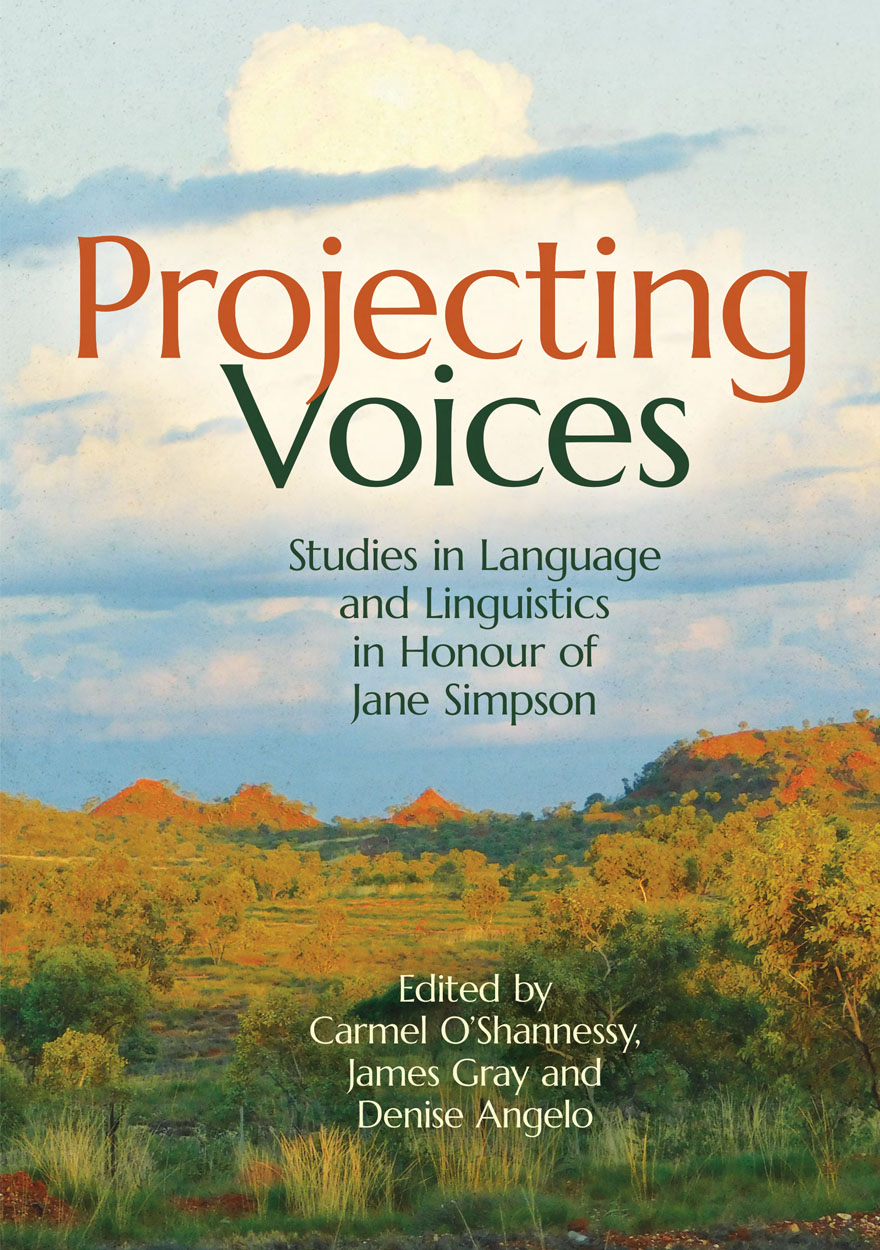
Projecting Voices »
Studies in Language and Linguistics in Honour of Jane Simpson
Publication date: 2025
This volume provides cutting-edge research on a wide range of questions in linguistics research, mostly centred on Australian Indigenous languages. Written by world-leading experts, the chapters take a fresh look at current questions in each topic, inspired by the work of Australian linguist Jane Simpson.
The chapters have implications for linguistic theory in the areas of historical linguistics, morphosyntax, semantics, the lexicon, language acquisition and issues in languages in education, and renewal of endangered languages.
This volume is essential reading for students and experienced researchers alike, with interests in theoretical and applied linguistics, especially in topics and issues related to Australian Indigenous languages.
Coming soon
Notify me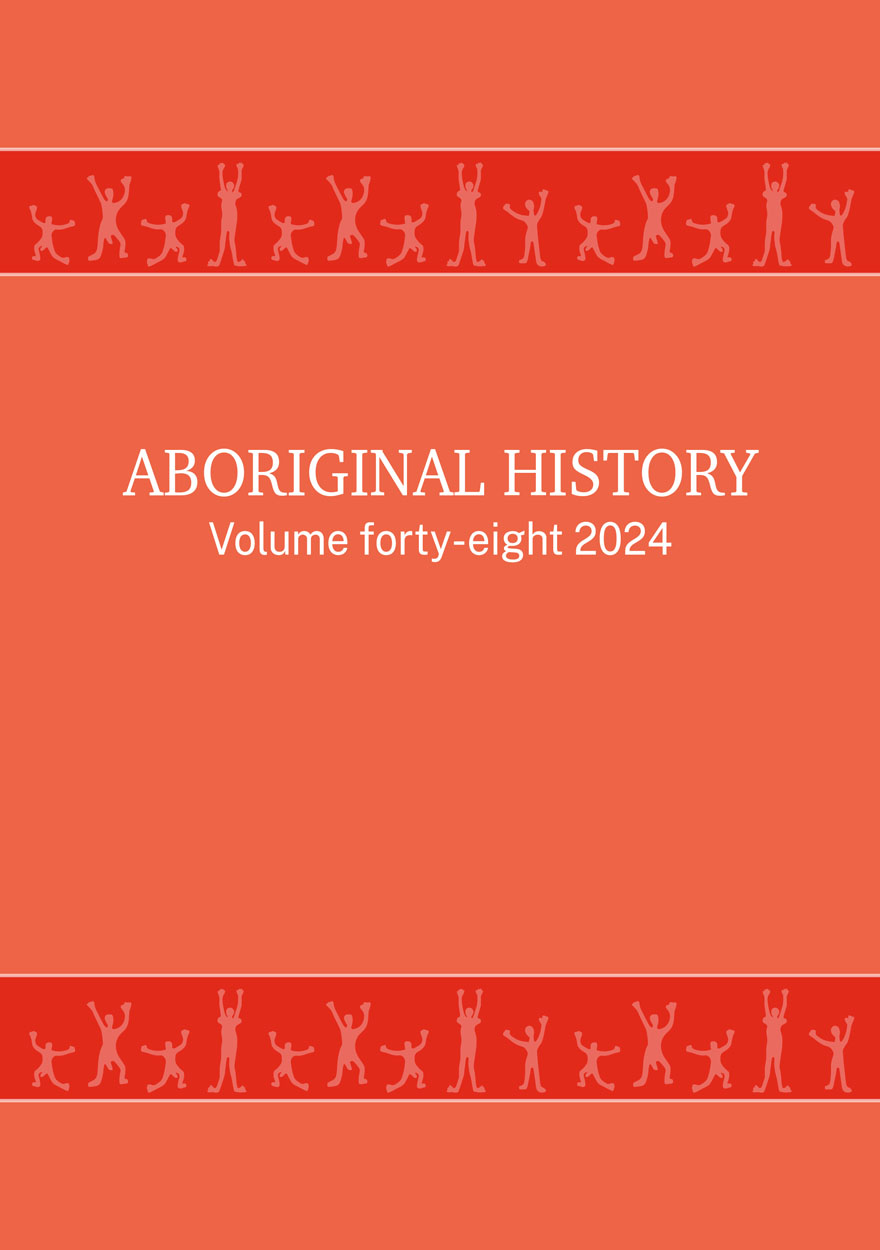
Aboriginal History Journal: Volume 48 »
Edited by: Crystal McKinnon, Ben Silverstein
Publication date: 2025
In this volume, Christopher Morton carefully traces the provenance of a Wiradjuri or Gamilaroi marara (tree carving) currently resting at the Pitt Rivers Museum in Oxford, considering its unfinished journey and the way it has been framed and recontextualised, as well as the ways it may experience a future return to good relation with and in Country. Julia Mortensen draws on oral histories of life and mobility in and around the Yumba – a ‘fringe camp’ at Cunnamulla – to narrate generations of autonomy from formal state control, reconsidering the Yumba as a centre of Aboriginal action and community strength: the centre, not the fringe. And on the 35th anniversary of the publication of Henrietta Fourmile’s landmark article ‘Who Owns the Past?’, Kirsten Thorpe returns to this work, centring the archival sovereignty that Fourmile sought and towards which First Nations archivists work today. This sovereignty is reflected in the following conversation between Gundungurra woman Kazan Brown and non-Indigenous historians Emily O’Gorman and Grace Karskens, transcribed by Natalie Osborne, which represents Gundungurra Country as storied, enduring and under threat.
The volume includes two memorial sections, remembering Frances Peters-Little and Lyndall Ryan and reflecting on their vital contributions to this journal and to the wider field of Aboriginal history. Alongside several book reviews, we present a review forum responding to Shannyn Palmer’s Prime Ministers’ Literary Award-winning Unmaking Angas Downs: Myth and History on a Central Australian Pastoral Station.
Coming soon
Notify me
Rethinking Histories of Indonesia »
Experiencing, Resisting and Renegotiating Coloniality
Edited by: Sadiah Boonstra, Bronwyn Anne Beech Jones, Katharine McGregor, Ken M.P. Setiawan, Abdul Wahid
Publication date: 2025
Rethinking Histories of Indonesia: Experiencing, Resisting and Renegotiating Coloniality provides a critical evaluation of histories of Indonesia from the formal period of colonisation to the present day. The volume approaches Indonesian history through the lens of coloniality, or the structures of power and control that underpin colonisation and which persist into the present. Bringing together seventeen authors from across the world, the volume offers alternative conceptualisation of Indonesian history and lays bare the enduring legacies of and processes that reproduce coloniality.
“This is a significant and exciting volume in terms of its scale, the range of disciplines, approaches and topics included and, ultimately, for its contribution to the field of Indonesian history and historiography, and Indonesian studies and decolonial studies more broadly … The contributors to this book do [a great service to] students of Indonesian history, its cultures, society and politics, offering new sources, voices, approaches and perspectives. Overall, they provide a fresh and vital critique of not only Indonesia’s colonial history but its continuing lived influences on present day Indonesia and beyond.”
—Jemma Purdey, Australia-Indonesia Centre, Monash University
Coming soon
Notify me
Military History Supremo »
Essays in Honour of David Horner AM FASSA
Edited by: Joan Beaumont, Garth Pratten
Publication date: June 2025
Professor Emeritus David Horner AM FASSA is one of Australia’s greatest military historians and its fifth official historian of war and military operations. Few who undertake research in the field can do so without consulting his prodigious, authoritative and definitive publications. Serving for 25 years in the Australian Army before joining The Australian National University, Horner is the epitome of the soldier–scholar and has played a key role in establishing military history as an academic discipline in Australia.
This volume honours Horner’s long career of service to history and the nation. Authors pay tribute to Horner’s legacy by engaging with his scholarship, applying his conclusions to new case studies and contexts, reflecting and expanding on the subjects he addressed and the methodologies he employed, and pushing the boundaries of the discipline he was instrumental in founding. The breadth of Horner’s research is demonstrated by the subjects and themes they address, including strategic planning and policy, command, multinational operations, intelligence and defence policy. Military History Supremo both underscores Horner’s contribution to Australia’s military and intelligence history and highlights the vibrancy and relevance of the field today.
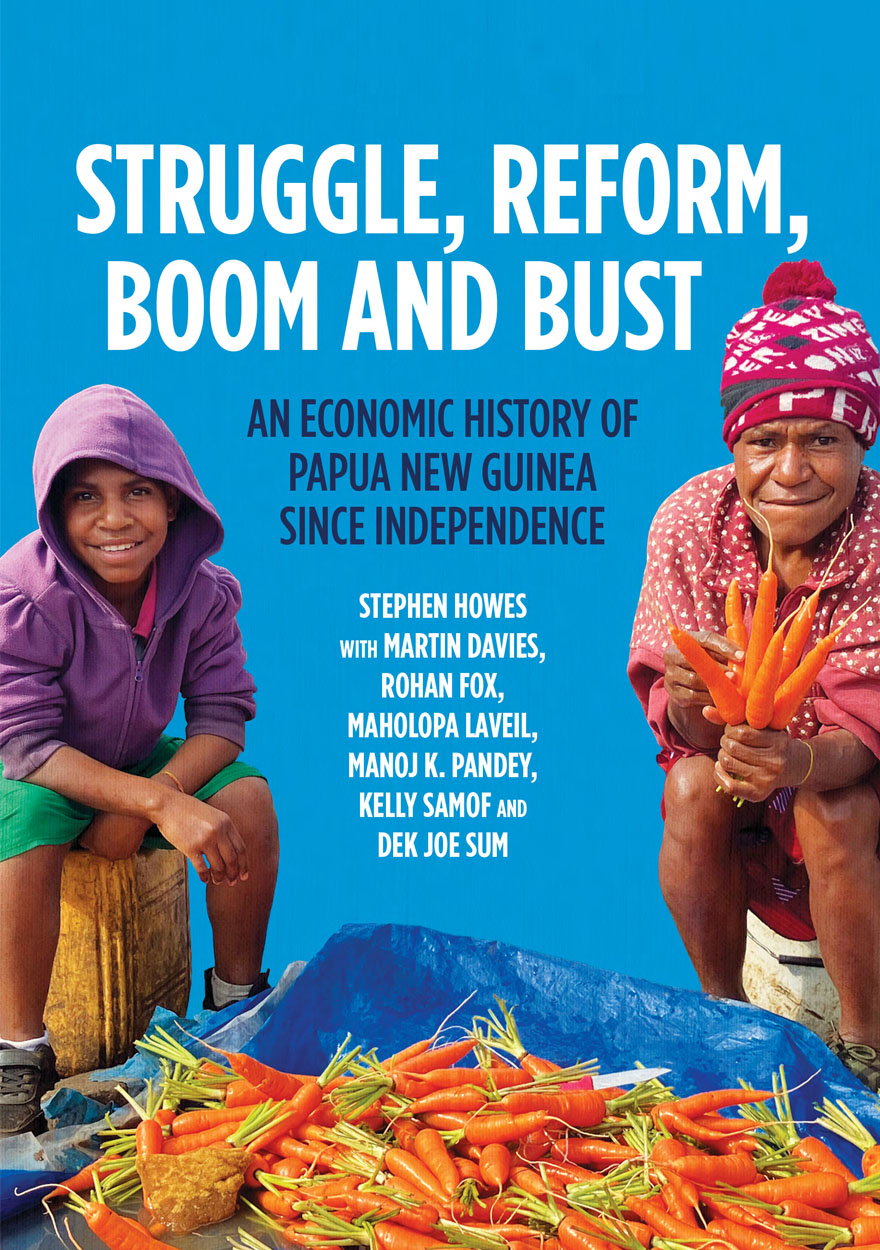
Struggle, Reform, Boom and Bust »
An Economic History of Papua New Guinea since Independence
Authored by: Stephen Howes, Martin Davies, Rohan Fox, Maholopa Laveil, Manoj K. Pandey, Kelly Samof, Dek Joe Sum
Publication date: 2025
Since Papua New Guinea’s independence in 1975, economic growth has been slow but volatile, with major changes in economic structure and policies, as well as in politics and governance.
This economic history, written to commemorate the fiftieth year of independence and the first to be produced in some 15 years, divides the half century since independence into four periods: the relative stability but also early struggles of the seventies and eighties; the crises and reforms of the nineties; the boom of the 2000s; and the quiet bust of the 2010s. Two chapters cover each period’s major economic, policy, institutional and political developments. The final three chapters provide an overall assessment of economic performance and policies since independence and link them with its politics and institutions.
The book combines painstaking documentation with original analysis to reveal both the strengths and weaknesses of the PNG economy, and theorises that the country’s hyper-politics and insecurity have combined to produce, and are reinforced by, a weak but stable state, and low and increasingly resource-dependent growth.
Data-driven, frank, insightful and engaging, Struggle, Reform, Boom and Bust is written by an expert team of economists from the University of Papua New Guinea and The Australian National University under the leadership of Professor Stephen Howes, Director of the ANU Development Policy Centre. It is an essential resource for anyone interested in the economy of Papua New Guinea, as well as an important contribution to the literature on the challenges and institutional determinants of post-colonial development.
Coming soon
Notify me
Australian Journal of Biography and History: No. 9, 2025 »
Special Issue: Oceania Lives
Publication date: June 2025
This special issue of the Australian Journal of Biography and History, ‘Oceania Lives’, showcases a collection of writing and dialogue from an emerging group of Pacific scholars interested in rethinking Australia’s past and present through historical biography. While spanning multiple time periods, geographies, and communities, the issue draws its thematic coherence from a sustained exploration of the different ways in which Pacific peoples – in this case, South Sea Islanders/Australian South Sea Islanders, Papua New Guineans, Tongans, Pitcairners, West Papuans, Solomon Islanders and Fijians − have and continue to encounter Australian coloniality in its various forms.
The issue is notable for its inclusion of two dialogues, drawn from public events hosted in recent years by the Oceania Working Party of the Australian Dictionary of Biography. These dialogues, with their related emphases on indigeneity, relationality and knowledge production, set the scene for the entire special issue which aims to interrogate and explore the position of Pacific peoples on Indigenous lands and waterways which comprise contemporary Australia. Melinda Mann, Kim Kruger and Imelda Miller powerfully demonstrate how this can be done through their approaches to writing South Sea Islander biography while Lisa Hilli also reflects on her artistic and biographical method in conversation with Wendy Mocke about the FMI (or Daughters of Mary Immaculate) sisters of Vunapope, New Britain, who helped save hundreds of lives during the Second World War.
In addition to the dialogues, ‘Oceania Lives’ features four reflective pieces and three research articles. Using the Tongan narrative approach, talanoa-vā, Ruth (Lute) Faleolo and Emma ‘Ilaiū Vehikite use the written records of Wesleyan missionary Walter Lawry to reimagine the early 19th century voyage of Futukava to Australia. In ‘My grandmother is (not just) a small brown fragment’, Pauline Reynolds responds poetically to an archival note attached to a tapa or barkcloth donated to the Macleay Collections. Christopher Chevalier offers valuable reflections on the completion and publication of his biography of Solomon Mamaloni and Romitesh Kant pays special tribute to the work of Professor Brij Lal, a pioneer in Pacific biography and so much more. In their research articles, Talei Luscia Mangioni and Camellia Webb-Gannon bring to life the stories of Melanesian activist women Amelia Rokotuivuna from Fiji and the Black Sistaz from West Papua. Finally, Nicholas Hoare and Theresa Meki ask, ‘What ever happened to the Papua New Guinea Dictionary of Contemporary Biography?’ Their answers – like those of other contributors to this issue − point to both the challenges and opportunities in writing about and working with Oceania lives in 2025.
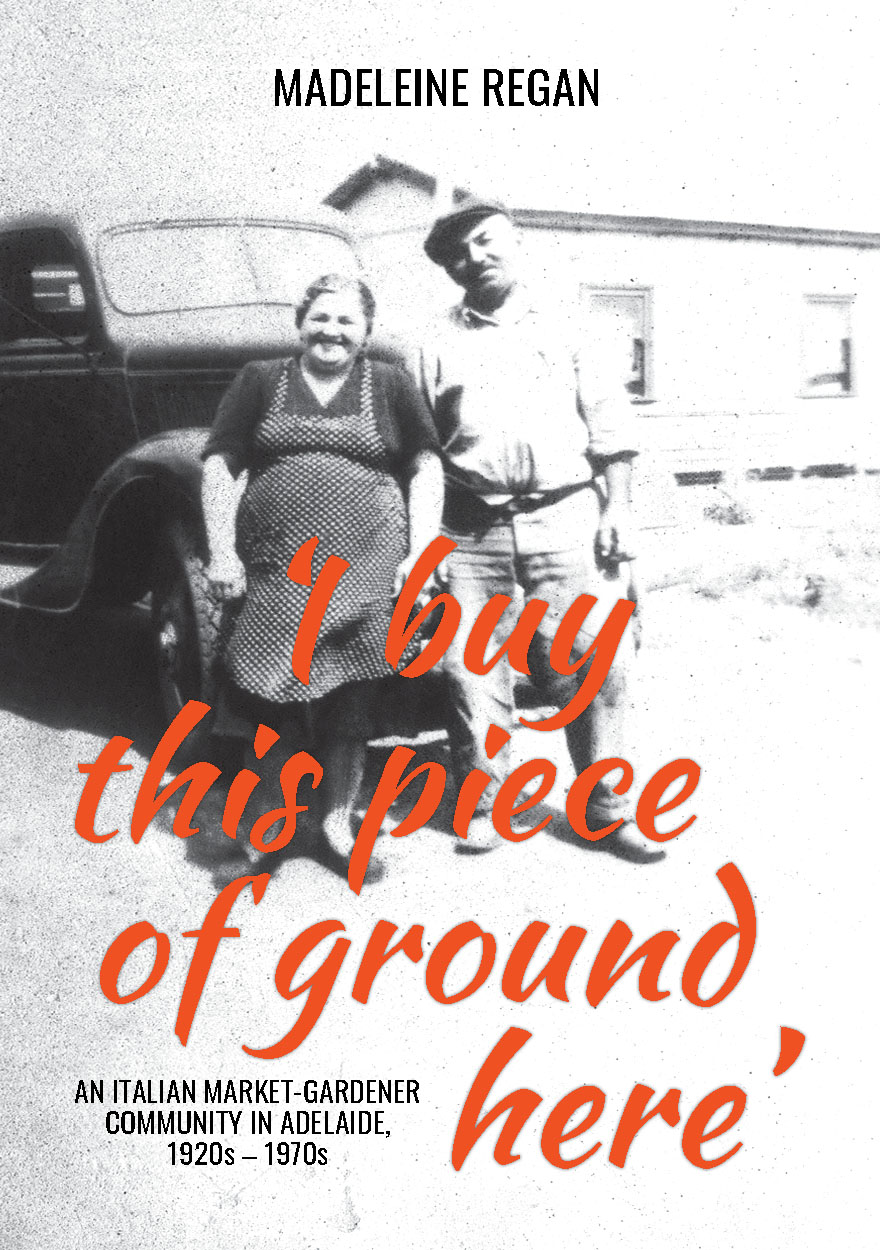
‘I buy this piece of ground here’ »
An Italian market-gardener community in Adelaide, 1920s–1970s
Authored by: Madeleine Regan
Publication date: May 2025
‘I buy this piece of ground here’ is a group biography that examines the lives and work of a cohort of Italian migrant families from the Veneto region who arrived in Australia in the 1920s and formed a new community and identity as market gardeners in outer suburban Adelaide.
This book investigates the settlement processes in a period of Australian migration history often overlooked in favour of post–World War II studies of mass migration and multiculturalism. It considers the impacts of the Depression, fascism, World War II, the White Australia environment that excluded southern Europeans and, ultimately, the suburbanisation that overtook their community.
Drawing on 65 oral histories with sons and daughters of the first generation, archival and published records, the narrative reveals what it felt like to work market gardens that became economic and emotional anchors for a new community. The first generation raised families, worked and bought the land, planted vegetables, bartered for glasshouses, sold produce at market, celebrated in packing sheds and established a stable, resilient community between the wars.
The Veneto families developed successful commercial market gardens and created a self-contained village or paese in a small area west of Adelaide. Withstanding marginalisation, the market gardeners lived and worked together in a small community, prospered and created an economy, a sense of belonging and a future for their children.
‘A formidably detailed piece of research and the product of a most fruitful community collaboration.’
—Frank Bongiorno AM, Professor of History, ANU
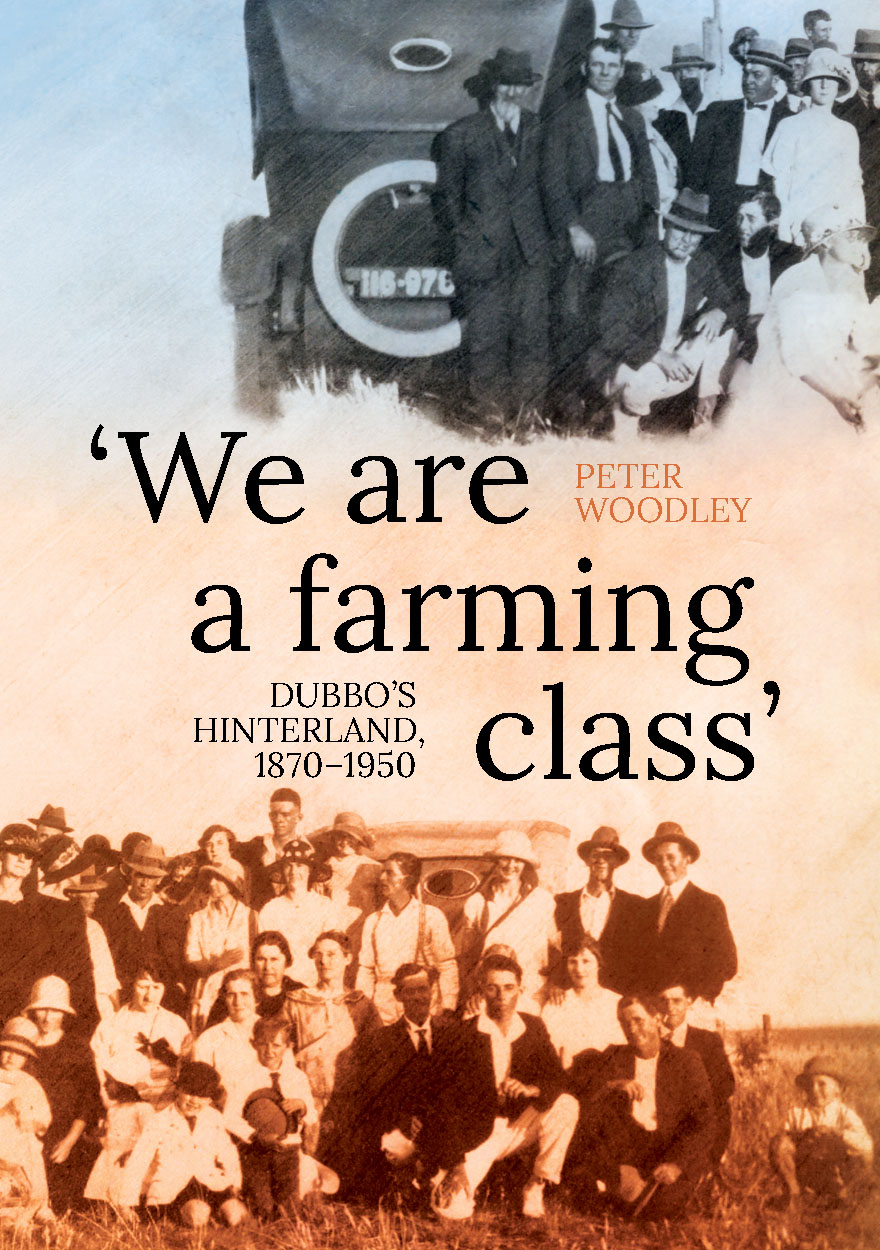
‘We are a farming class’ »
Dubbo’s hinterland, 1870–1950
Authored by: Peter Woodley
Publication date: April 2025
Notions of an arcadian farming life permeate settler-Australian understandings of themselves and their nation. Qualities of hard work, perseverance, resourcefulness, and a steady devotion to family and community—the historian John Hirst’s Pioneer Legend—are idealised in this nation. But the people from whom the legend is derived have rarely been studied in depth. They are more the stuff of myth and fond imagining than of concerted examination. To what extent is the legend built on lived experience? How have farming people thought of themselves and their contribution to a wider national mythos? ‘We are a farming class’ examines the lives of people in the farmlands surrounding Dubbo in the New South Wales central west between the 1870s and the 1950s, from free selection and the establishment of agriculture to the dawning of postwar prosperity and change. What emerges is a closely documented, ethnographically rich portrait of a way of life and culture at once distinctive and surprising, recognisable and unknown.

The Wild Australia Show »
The Story of an Aboriginal Performance Troupe and its Afterlives
Authored by: Paul Memmott, Maria Nugent, Michael Aird, Lindy Allen, Chantal Knowles, Jonathan Richards
Publication date: 2025
The Wild Australia Show was a troupe of 27 Aboriginal performers recruited from northern Queensland in the 1890s for a world tour that would culminate at the World’s Columbian Exposition in Chicago in 1893. Those grand plans were ultimately dashed, and the troupe only performed in Brisbane, Sydney and Melbourne before disbanding. This book tells the story of the Wild Australia Show from its inception to its afterlives. It traces how the performers were recruited, the places they came from, the repertoire they created, rehearsed and performed, their experiences on tour and the politics of their representation in word and image. Drawing on an extensive archive of newspaper reports, government records, and court proceedings, richly complemented by photographs and other visual images, the authors seek to reconstruct the Wild Australia Show story from the perspectives of the performers themselves. The book contributes to a growing literature on the history of Aboriginal performers and performances under colonial conditions, and the ways in which public performance could be a means for cultural survival and resurgence.
Coming soon
Notify me
Dregs »
Love and Monsters in Small Town New Zealand
Authored by: Laura McLauchlan
Publication date: March 2025
Girls who join dog packs, boys who gain strength from trees, men who love bodies with nobody in them: Dregs is a collection of tenderly monstrous love stories, set in a shadowy small town of the same name. Based in South Canterbury, New Zealand, these lovingly disturbing fictions welcome the strange and other-worldly, while keeping an ethnographic eye trained on the classed, religious, gendered, racialised and species-based forces shaping this rural region of New Zealand's South Island.
While at times grotesque, these darkly loving, richly illustrated tales offer new avenues for ethnographic research and shed new light on the region, giving voice and form to unspoken aspects of this antipodean rural idyll. Shaped by a deep respect for the monstrous feminine, regardless of the gender of the bodies in which such forces appear, Dregs: Love and Monsters in Small Town New Zealand is a product of both an anthropological sensibility and a trust that naming and finding ways to live well with our monsters is a vital aspect of living well in our times.



